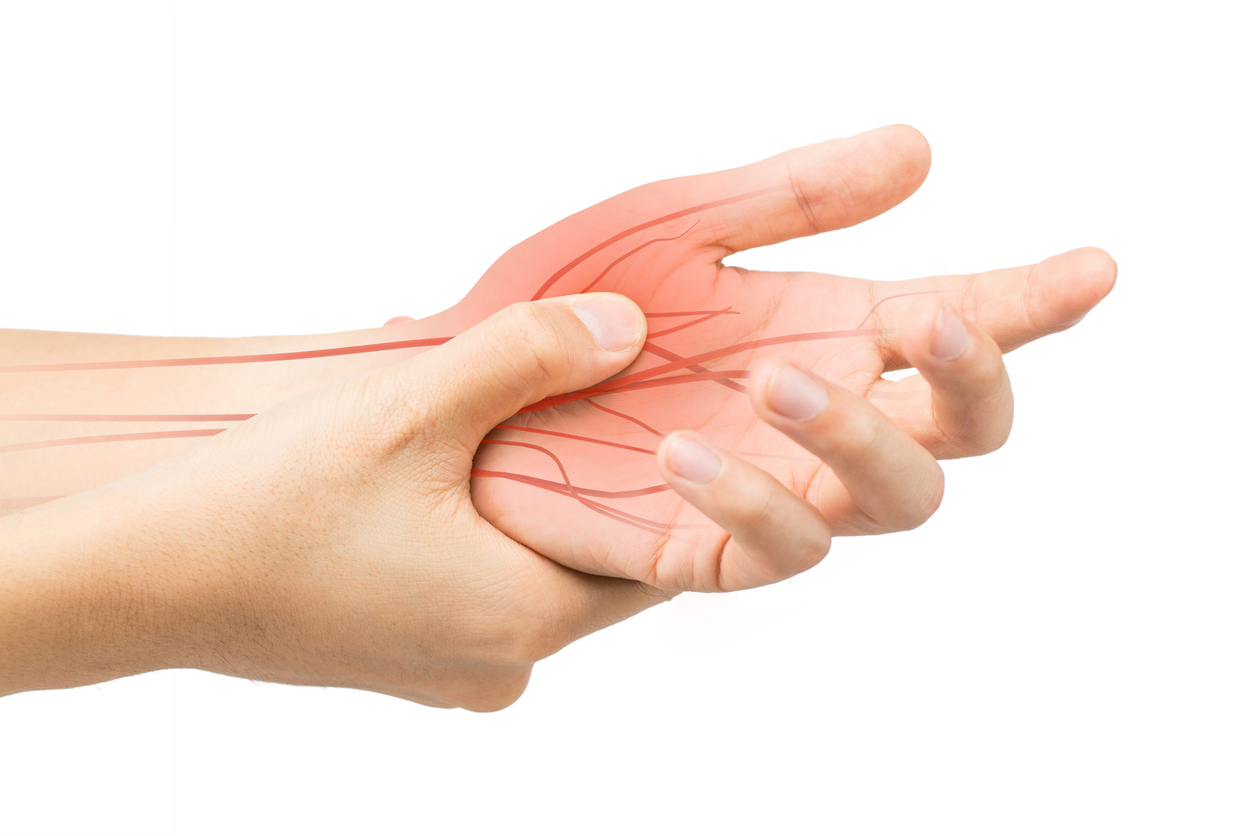By: Dr. Corey Finan BSc., DC, CCSP, RMT, ART
Carpal Tunnel Syndrome (CTS) is a condition in which the patient feels pain, numbness, tingling and other symptoms that can be uncomfortable or painful in the hand and arm. It is caused by the compression of the nerve in the carpal tunnel, hence it’s name. The carpal tunnel is a narrow passageway on the palm side of the wrist. The issue is related to the median nerve which goes from your forearm and through the carpal tunnel passageway to your hand. It is responsible for sensation in your hands as well as muscle function. When this nerve is irritated, or the passageway is narrowed, then we feel the symptoms of Carpal Tunnel Syndrome.
Causes can range from arthritis and inflammation, workplace factors such as computer work and working with tools where repetitive motion is required. Obesity is a risk factor, and females tend to suffer from this condition more often than men.
Carpal Tunnel Syndrome will usually start off progressing in a gradual way. The most common symptoms include the following:
Tingling and Numbness – this could be in your hand or in your fingers and is often felt in the thumb, index, middle or ring fingers. The sensation may travel from the wrist and even into the arm. You may feel these sensations when the hands are outstretched doing something such as holding a newspaper or book, or a smart phone.
Weakness – You may feel like your hands are weaker than usual. This could be due to the numbness and the issues that are happening in the median nerve.
Preventative Measures:
- Taking the stress off of your hands and wrists where possible.
- If your work contributes to this you can first look at your keyboard and mouse and invest in tools that don’t strain your wrists.
- Take breaks and stretch the area by gently stretching your hands and wrists back and forth.
- Alternating tasks and giving your hands a break can be helpful.
- If you’re working outside, try keep your hands and wrists warm with gloves or fingerless gloves when required.
Other Things to Consider:
Carpal Tunnel Syndrome can occur in anyone, but there are some things that you may want to look at first before thinking you have CTS. First, there is a much more common cause for numbness and pain in the hand / fingers, and that is Cubital Tunnel Syndrome, which is a nerve entrapment in the elbow where the nerves enter the forearm. Often repetitive strain at the hand and wrist can cause the muscles in the forearm and elbow to become tight, and thus compress the nerves to your hand. Another important caveat would be to consider whether conservative care would be a better alternative for you, or if surgery may be the way to go. A trial of conservative care, specifically Active Release Therapy (ART), may prevent the need for surgery. You can easily determine that by doing a Diagnostic Ultrasound of the Median Nerve at the Carpal Tunnel. If the nerve is enlarged, you can be certain that it is inflamed at the tunnel. This would indicate that the decompression surgery typical of CTS surgery would be of benefit to you. However, if the nerve is of normal size, then you should not do the surgery, and seek conservative care and look elsewhere in the body for the problem. These are simple guidelines that can help you determine which direction to go. All of the Doctors at AST can order the Diagnostic Ultrasound imaging and can interpret the results and give guidance as needed.
Treatment From Our Clinic
If you think you may be suffering from Carpal Tunnel Syndrome, our clinic has several treatments that might benefit you. Active Release Techniques for one can be very helpful to treat this syndrome. The practitioner will evaluate your mobility and tightness of the area which will usually be due to the presence of scar tissue. By using manual pressure, the practitioner can break up the scar tissue to lessen the pressure on the median nerve, resulting in a reduction in symptoms. Many people can find relief in just a few treatments! There are several forearm muscle stretches and exercises that we can teach you to help remove some of the symptoms, and more importantly keep them at bay once you improve. We also provide IMS which can help with pain relief in the forearm muscles, and Graston Technique which is an instrument assisted soft tissue treatment designed to help break down scar tissue and release tight muscles. Shockwave Therapy and Laser Therapy can also be additional therapies that can speed recovery. We have seen hundreds of cases of Carpal Tunnel Syndrome over the years with most resolving successfully in a relatively short period of time.
If you believe that you might be suffering from Carpal Tunnel Syndrome, please give us call to book your appointment.
*This blog is not intended to officially establish a physician-patient relationship, to replace the services of a trained physician, naturopathic doctor, physical therapist or chiropractor or otherwise to be a substitute for professional medical advice, diagnosis, or treatment.


